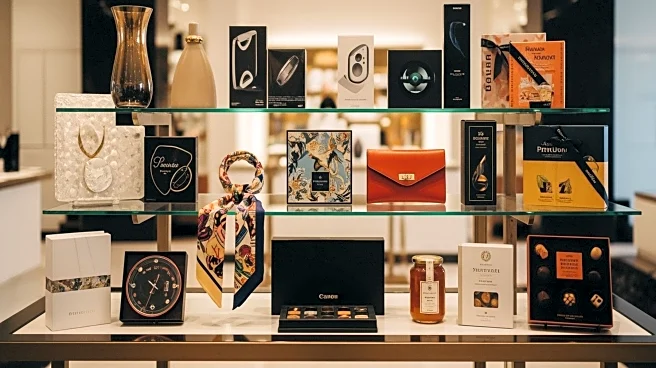What's Happening?
John Lewis, a prominent department store, has partnered with Russell & Bromley to introduce a new supplier brands platform aimed at enhancing its premium brand offerings. This initiative is part of John Lewis's strategy to accelerate the launch and sales
of new brands, particularly in the fashion sector. The platform, powered by tech company Mirakl, utilizes a direct shipping model to expedite the market introduction of new products. Rachel Morgans, John Lewis's director of fashion, emphasized the company's ambition to become the leading destination for premium brands in the UK. The platform's launch is exemplified by the inclusion of Russell & Bromley, showcasing the caliber of brands John Lewis is attracting. In August, John Lewis added 100 new premium fashion brands to its stores, including high-end labels like Mulberry, to strengthen its position against competitors such as Next and M&S.
Why It's Important?
The launch of the supplier brands platform is a significant move for John Lewis as it seeks to solidify its position in the competitive retail market. By focusing on premium brands, John Lewis aims to differentiate itself from rivals and attract a more affluent customer base. This strategy could potentially increase its market share and drive higher sales margins. The partnership with Russell & Bromley and the addition of high-end labels like Mulberry indicate a shift towards a more upscale fashion offering, which could enhance the store's reputation and customer loyalty. As the retail industry continues to evolve, John Lewis's ability to quickly adapt and introduce new brands may provide a competitive edge, particularly in the digital marketplace.
What's Next?
John Lewis is likely to continue expanding its premium brand portfolio, leveraging the supplier brands platform to introduce more high-end labels. The retailer may also explore additional partnerships with other luxury brands to further enhance its fashion offerings. As the platform gains traction, John Lewis could see increased customer engagement and sales, prompting further investment in digital and in-store experiences. Competitors such as Next and M&S may respond by bolstering their own premium offerings, leading to heightened competition in the sector. The success of this initiative could influence other retailers to adopt similar strategies, potentially reshaping the landscape of the UK retail market.
Beyond the Headlines
The introduction of the supplier brands platform by John Lewis may have broader implications for the retail industry, particularly in terms of supply chain efficiency and brand partnerships. By utilizing a direct shipping model, John Lewis can reduce lead times and improve inventory management, which could set a precedent for other retailers seeking to optimize their operations. Additionally, the focus on premium brands may reflect a broader trend towards luxury and exclusivity in consumer preferences, influencing fashion industry dynamics and marketing strategies. This shift could also impact the types of collaborations and innovations pursued by fashion brands, as they seek to align with retailers that offer enhanced visibility and market access.















